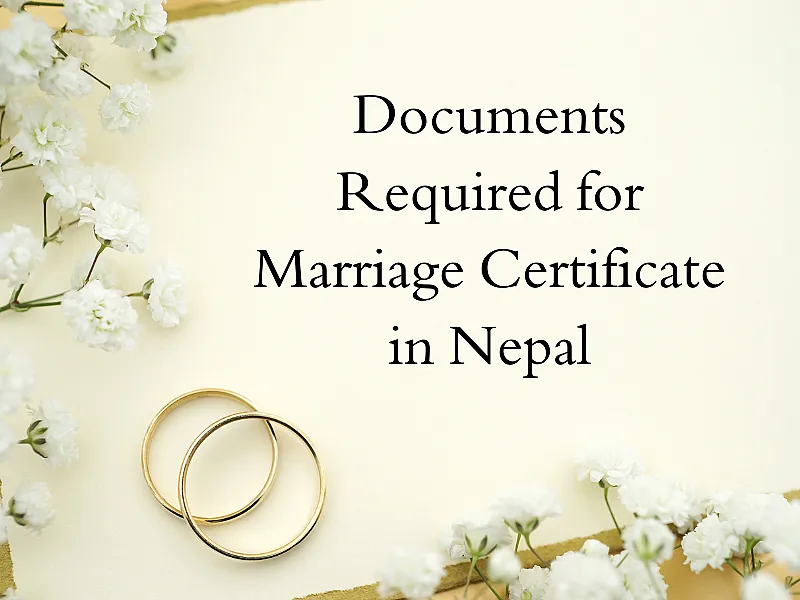
Table of Contents
This Article provides a complete guide into the documents required for Marriage Certificate in Nepal.
In Nepal, registering your marriage and obtaining a marriage certificate is essential for it to be legally recognized.
Legal Background for Marriage Registration in Nepal
Marriage registration in Nepal is based on the Muluki Civil Code, 2074 (2017), which makes sure your marriage is recognized under the law. Marriage registration is a vital legal process in Nepal, ensuring that a marriage is officially recognized by the state. The process is governed by specific laws, primarily the Muluki Civil Code, 2074 (2017). The legal provisions and procedures for marriage registration in Nepal, is outlined in Section 77 of the Muluki Civil Code.
According to Section 77
This provision allows a man and woman to formalize their marriage through registration without a traditional ceremony.
1. Application for Marriage by Registration:
Couples can file an application at the District Court (if in Nepal) or the Nepali embassy/consulate general (if abroad).
The application must include:
- Personal details (names, surnames, ages, addresses, professions).
- Names of parents and grandparents.
- Details of any previous marriages and their dissolution (if applicable).
- Names of at least two witnesses.
2. Residency Requirement:
It is a document from the local authority that confirms both parties have been living in Nepal for at least 15 days. At least one of the applicants must have resided in the concerned district (for District Court applications) or the country (for embassy/consulate applications) for at least 15 days before filing the application.
3. Proof of Citizenship
As per the Muluki Civil Code, the legal minimum age for marriage in Nepal is 20 years. Both parties should provide their valid citizenship certificates.
4. Passport-Sized Photos
Each person must submit at least 4 recent passport-sized photos.
5. Unmarried Certificate
This certificate, issued by the embassy or relevant local authority, should confirm that both individuals are single and legally eligible to marry.
6. Citizenship of Witnesses
The original citizenship documents of the witnesses will need to be presented.
7. Divorce Decree (if applicable)
If one or both individuals have been married before, a legal divorce decree or certificate must be provided.
8. Fee Payment Receipt
A receipt confirming that the marriage application fee has been paid, as issued by the court. Thus with the mentioned documents, the marriage certificate can be obtained.
Thus with the mentioned documents, the marriage certificate can be obtained.
Disclaimer: This article is for informational purposes only and shall not be construed as legal advice, advertisement, personal communication, solicitation or inducement of any sort from the firm or any of its members. The firm shall not be liable for consequences arising out of any action undertaken by any person relying on the information provided herein.